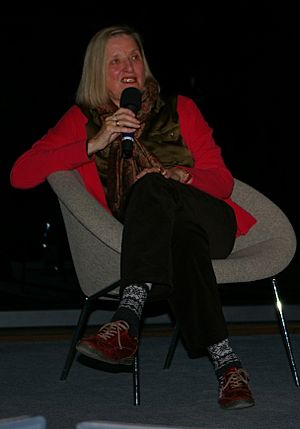Helma Sanders-Brahms facts for kids
Quick facts for kids
Helma Sanders-Brahms
|
|
|---|---|

Sanders-Brahms in 2011
|
|
| Born |
Helma Sanders
20 November 1940 |
| Died | 27 May 2014 (aged 73) |
| Occupation | |
| Years active | 1971–2014 |
| Movement | New German Cinema |
Helma Sanders-Brahms (born November 20, 1940 – died May 27, 2014) was a German film director, screenwriter, and producer. She was known for making movies that often explored important social issues and personal stories, especially about women and German history.
Contents
About Helma Sanders-Brahms
Helma Sanders was born in Emden, Germany. She first studied acting in Hanover from 1960 to 1962. After that, she went to Cologne University to study literature and drama. Before becoming a famous filmmaker, she worked as a hospital helper and as an announcer for a TV station in Cologne called WDR-3. She made short films and documentaries for the station.
In 1967, she traveled to Italy and got to work with famous film directors Pier Paolo Pasolini and Sergio Corbucci. This experience was very important and helped her decide to become a filmmaker herself.
Her Filmmaking Journey
Starting in 1969, Helma Sanders-Brahms began making her own movies. She wrote her own scripts and often produced her films too. Her movies included both fictional stories and real-life documentaries. Many of her films also included parts of her own life story.
Her early films looked closely at topics like work, people moving to new countries (migration), and the lives of women in West Germany. For example, her 1971 TV film Gewalt was about workers on an assembly line at a Ford factory. In 1973, her documentary Die Maschine won an award called the FIPRESCI Prize.
Her film Under the Pavement Lies the Strand was very important for the women's movement and student movement in Germany. It also helped her become known as a filmmaker who focused on women's issues. Another TV movie, Shirin's Wedding, told the sad story of a Turkish person who moved to Germany and faced difficult situations.
Helma Sanders-Brahms also had a special interest in the writings of Heinrich von Kleist, a classic German author. She made at least three films that were based on his work or referred to him.
Later Films and Recognition
In the late 1970s, Sanders-Brahms' films started to focus less on big political topics and more on deep personal feelings. She often explored the relationships between mothers and daughters, linking them to Germany's complicated history.
She became famous around the world with her film Germany, Pale Mother. This movie showed the experiences of German women during and after the Nazi period. As a director in the New German Cinema movement, her stories often looked at ideas important to people who wanted social change.
Her last movie for theaters was Geliebte Clara ("Beloved Clara"). It was about the interesting relationship between the musicians Robert Schumann, Clara Schumann, and Johannes Brahms. Helma Sanders-Brahms' films won many awards at film festivals all over the world. In 1982, she was even a judge at the 32nd Berlin International Film Festival.
Awards and Honours
Helma Sanders-Brahms received several important awards and recognitions for her work. She was made an Officier of the French Ordre des Arts et des Lettres, which is a special honor for people who have contributed to arts and literature. She also became a member of the Academy of Arts, Berlin.
Death
Helma Sanders-Brahms passed away in Berlin on May 27, 2014, from cancer. She was 73 years old.
Legacy
Outside of Germany, Helma Sanders-Brahms was highly praised by film critics in countries like the United States, France, Japan, and the United Kingdom. However, in her home country of Germany, her work was not always as well-liked by critics. Some German critics found her films "heavyhanded" or too focused on personal feelings.
Shortly before she died, she said, "Before I die, I’d just like to make one last attempt to rescue my films from oblivion in my country and say: at least have a look at them." This shows how much she wanted her films to be seen and understood by people in Germany.
Selected Filmography
- Violence (1971, TV film)
- The Employee (1972, TV film)
- The Machine (1973)
- The Last Days of Gomorrah (1974, TV film)
- Under the Pavement Lies the Strand (1975)
- Earthquake in Chile (1975, TV film)
- Shirin's Wedding (1976)
- Heinrich (1977)
- Germany, Pale Mother (1980)
- No Mercy, No Future (1981)
- The Future of Emily (1984)
- Laputa (1986)
- Felix (Segment: "Er am Ende") (1988, anthology film)
- Apple Trees (1992)
- My Heart Is Mine Alone (1997)
- Geliebte Clara (2008)
See also
 In Spanish: Helma Sanders-Brahms para niños
In Spanish: Helma Sanders-Brahms para niños
- Women in Germany
 | Selma Burke |
 | Pauline Powell Burns |
 | Frederick J. Brown |
 | Robert Blackburn |

